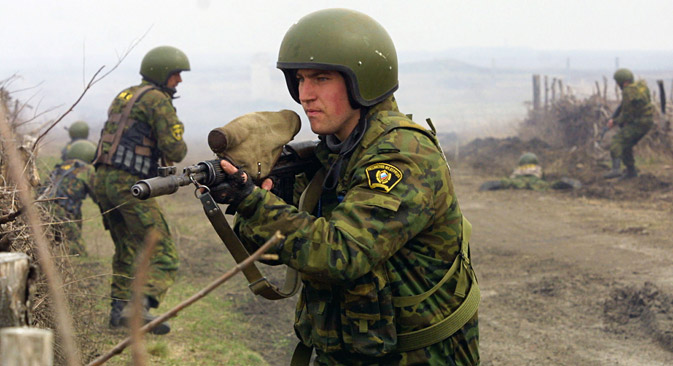
Anti-terror exercise underway in Southern Russia, 2005. Source: Valery Matytsin / TASS
As the Islamic State militant radical group (ISIS) continues to expand its global drive to recruit new followers and fighters to its cause, Russia has announced a new initiative that it hopes will help alert authorities to individuals that have succumbed to the lure of ISIS propaganda.
On August 1 the Russian Civic Chamber (CC) will launch a hotline for those whose relatives believe in the Islamic State ideology (the group is recognized as a terrorist organization in Russia) or, possibly, have already left to fight under its banner in Syria.
The chamber believes that currently the hotline "is a necessity." Yelena Sutormina, Chairwoman of the CC Commission on the Development of Social Diplomacy and Support for Compatriots Abroad, says that it was decided to establish the hotline after student Varvara Karaulova had tried entering Syria. In June the 19-year-old was detained on the Turkish-Syrian border and, according to an investigation, had been recruited by radical Islamists.
"Later, just recently, the Russian foreign minister announced that 2,000 former and current Russian citizens are now fighting in the ISIS army. That means there are many people," explained Sutormina, adding that "something must be done about it: Russia, as a multinational and multi-confessional country, is very attractive for ISIS militants."
The hotline will offer psychological support, as well as consultation on how to avoid falling victim to the recruiters.
In the last few months Russian mass media has been reporting more on the ISIS threat. Along with the official announcements that "there is a real ISIS presence near the Russian borders," there are also news on attempts to recruit young Muslims and migrants in the regions (ISIS offers the latter a monthly salary of 50,000 rubles, or $880).
Moreover, in June a video appeared on the internet reporting that the North Caucasus underground had sworn allegiance to Islamic State. However, according to Vitaly Naumkin, director of the Russian Academy of Sciences’ Institute of Middle Eastern Studies, "it is still to early to panic about this.” Naumkin believes that the virtual "oath" does not mean that all North Caucasus groups are now controlled from one center, adding that "Russian law enforcement agencies have begun suppressing their activity more effectively."
Caucasus expert and International Crisis Group consultant Varvara Pakhomenko, meanwhile, said that if we look at the number of deaths and military clashes in Northern Caucasus, it becomes clear that recently there have been fewer incidents. According to the Kavkazsky Uzel internet publication, 1,149 people were killed or wounded in the North Caucasus in 2013, and 44 people in the second quarter of 2015.
The general decline is due to two factors, said Pakhomenko. Firstly, it is true that a substantial number of militants and radical Islamists have already left for Syria. Secondly, many militants and potential militants were killed, pushed out of the country or arrested on the eve of the Sochi Olympics.
Experts admit that the main approach to fighting the radicals in Russia has been with force. But limiting the fight merely to combat operations is ineffective, "though it is definitely necessary," says Sergei Markedonov, Caucasus expert and professor at the department of Foreign Regional Studies and Foreign Policy at the Russian State University for the Humanities.
"It seems that these radicals are disappearing, but three or four years pass and they start reappearing because the environment that creates them is still there. There needs to be more ‘soft power.’" In particular, Markedonov believes that the tactic of "working with brains" is much more important. Therefore, people who deal with Islam must be involved. They are the ones who have to create a project that would serve as an alternative for young people, for their careers and future.
When it comes to people in Muslim communities themselves, a "soft power" approach is favored. "We don't go out and catch anyone," said Rushan Abbyasov, First Deputy Chairman of the Russian Council of Muftis. "We try to enlighten, while it is the special forces who identity and apprehend the suspects."
The communities usually do not see the recruiters, who know that their views are unacceptable there. Yet there is still no talk of any new Islamic project among the country’s Muslim segment that would seek to counter the influence of ISIS. It is just that "people are beginning to distinguish white from black," while the communities are focused on preaching sermons, said Abbyasov.
Several years ago "soft power" methods were used on those who had already been on the side of militant radicals, said Varvara Pakhomenko. In 2010 there was a committee dedicated to helping militants readapt.
"Many of them had not had time to commit serious crimes. They had made a mistake and were given a chance to return to a peaceful life. It is very important to have the opportunity to return. People would just surrender,” she said. But with the preparations for the Olympics the dialogue ended, the committee stopped working and the harsh methods only made people harder. As a result, Pakhomenko says that today the Russian republics of Dagestan and Chechnya are the main places from which recruits have gone to fight jihad in Syria.
The committee has renewed its work now, but only in the neighboring North Caucasus region of Ingushetia. "We are noticing that there are people in the government who understand the necessity of such measures," said Pakhomenko.
All rights reserved by Rossiyskaya Gazeta.
Subscribe
to our newsletter!
Get the week's best stories straight to your inbox